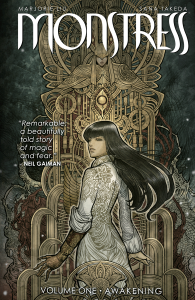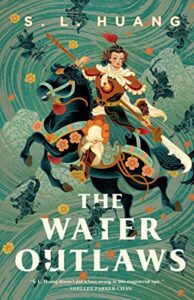Buy this from Bookshop.org to support local bookstores and the Lesbrary!
Oftentimes bleak but consistently awe-inspiring, Liu’s world of steampunk, art deco fantasy is a marvel to behold. This is definitely one to check the trigger warnings for.
Set in a world where humans and Arcanics (a cross between humans and a mystical race called Ancients) are at war, Monstress is the story of one Arcanic, Maika Halfwolf, who is searching for answers about her life whilst others threaten to end it. It is a story of oppression, war, and survival, weaved together with astounding detail and riveting lore.
What struck me during my time with this is its unabashed brutality. It is astonishingly dark, with violence akin to something like Berserk and worldbuilding which verges on lovecraftian: giant, cosmically horrifying gods; slavery, torture, and experimentation; and more than a few mentions of cannibalism. Coupled with the breathtaking art, we’re thrust into a world that is so visceral it becomes addictive. I could easily draw comparisons to a Miyazaki game such as Bloodborne with its grand aesthetics and remorseless atmosphere, but Monstress is wholly unique in its blend of mythology, magic, and feminine power. It is a story that not only features a female main character, but creates a world of deliberate female rage, with all of the important characters being female in the war-torn matriarchal society.
The story itself is unapologetically cruel with very few moments of respite. There are countless moments of violence, death, and suffering, points where you may think “surely not…”, but yes, it happens anyway. The intensity of the characters radiates off the page, each one fully realized and very believably capable of the atrocities which they commit. This is inclusive of our main character, Maika, who performs her own share of bloody vengeance as she attempts to uncover her past whilst dealing with an unknown force that threatens her life. Liu’s cast is filled with flawed, relentless characters who are almost all women—a rare treat in the world of comics.
Despite the horror of it all, however, there’s also a grand sense of wonder within the pages. Liu draws from a slew of Asian mythologies to create the world of Monstress, populating the world with a number of magical creatures (including talking cats!). The dichotomy between these fantastical elements and the otherwise horror-esque ones only lends to expand what fantasy can be, and is all I could hope for as a fan of both genres. I also greatly appreciate it as an outlier in the genre of dark fantasy; too often in said genre are women used as props, only written to serve as a victim and experience assault at the hands of male characters to prove the “darkness” of the world, or to further the male character’s story.
Overall, if you’re looking for a brutal, enchanting, sapphic fantasy comic with enough horror and violence to leave you feeling uneasy, then you will love Monstress as much as I did.
Content Warnings: Graphic depictions of death, violence, gore, body horror, starvation, dismemberment, mutilation of corpses, child abuse/murder, animal abuse/murder, war
Lizzie is a femme non-binary (they/she) reader who loves anything weird, fantastical, and queer. You can find them predominantly on their instagram @creaturereader where they share pretty books and diverse recs.


